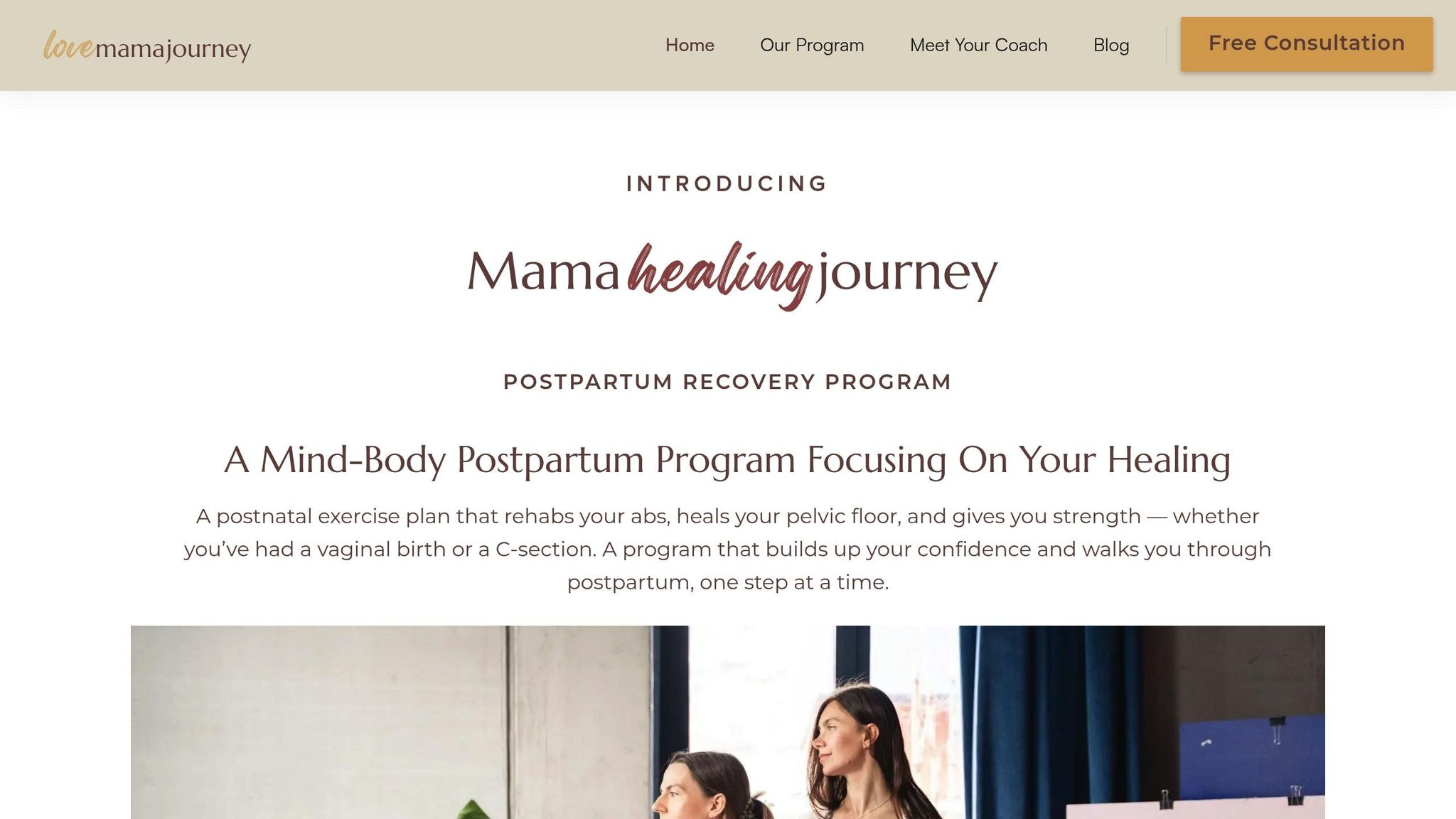Becoming a new mom is life-changing, but it can also feel overwhelming. After childbirth, many women experience a mix of emotions - joy, anxiety, mood swings, and even frustration. These feelings are often linked to hormonal shifts, sleep deprivation, and the physical recovery process. While most new moms go through the “baby blues,” lasting a few weeks, some may face more serious conditions like postpartum depression or anxiety, which require professional support.
Here’s what you need to know:
- Common emotions: Joy, worry, mood swings, and overwhelm are normal postpartum experiences.
- Hormonal changes: A drop in estrogen and progesterone, along with oxytocin surges, can impact mood.
- Baby blues vs. postpartum depression: Baby blues are short-lived, while postpartum depression is more intense and persistent.
- When to seek help: If emotions interfere with daily life or last beyond a few weeks, talk to a healthcare provider.
- Self-care tips: Mindfulness exercises, journaling, and quick relaxation techniques can help manage emotions.
Postpartum recovery is both emotional and physical. Taking small steps to care for your mental health - like practicing deep breathing or reaching out for support - can make this transition smoother. Remember, asking for help is a strength, not a weakness.
What Emotions to Expect After Delivery
The days and weeks after childbirth can feel like an emotional rollercoaster. Your feelings might shift rapidly, and understanding what’s typical can make this period feel less overwhelming. Below, we’ll explore common emotions new moms experience and how to recognize when it’s time to seek additional support.
Normal Emotions New Moms Feel
Joy and euphoria are emotions many new moms describe, especially during those quiet moments holding their baby. You might feel an incredible sense of love and protectiveness that’s hard to put into words.
Anxiety and worry often go hand in hand with new parenthood. You might find yourself hyper-aware of every sound your baby makes, questioning feeding schedules, or doubting your ability to care for your little one.
Mood swings are incredibly common. One moment you’re laughing at your baby’s adorable expressions, and the next, you’re upset over something as small as spilling a drink. These emotional ups and downs can happen with no clear reason and are a normal part of the postpartum experience.
Overwhelm is another frequent feeling. Between recovering physically, adjusting to sleep deprivation, and learning how to care for a newborn, it’s easy to feel like you’re drowning in responsibilities. You might even feel guilty for not cherishing every moment, which only adds to the pressure.
Irritability and impatience can sneak in, too, especially when exhaustion takes over. You might find yourself snapping at your partner or feeling frustrated by visitors. These feelings are your body’s way of signaling that you’re stretched thin and need to conserve energy.
How Hormones and Physical Changes Affect Your Mood
These emotional highs and lows are closely tied to the hormonal and physical changes your body goes through after delivery. The drop in estrogen and progesterone levels after childbirth can trigger mood changes. At the same time, oxytocin, often called the "love hormone", surges during breastfeeding and skin-to-skin contact, promoting bonding but also contributing to emotional swings.
Sleep deprivation only amplifies these effects. Running on just a few hours of sleep can make it harder for your brain to regulate emotions. Meanwhile, physical recovery adds another layer - pain, discomfort, and mobility limitations can make you feel vulnerable or frustrated. On top of that, breastfeeding challenges like soreness or concerns about milk supply can lead to feelings of inadequacy. These are all common experiences that can affect emotional well-being.
Understanding these factors can help you recognize when your emotions are typical and when they might signal something more serious.
Baby Blues vs. Postpartum Depression: What's the Difference
While many emotional shifts are normal, it’s important to distinguish between the baby blues and more serious conditions like postpartum depression.
The baby blues are extremely common, affecting many new moms in the days after delivery. These feelings - such as crying spells, mood swings, anxiety, and overwhelm - tend to peak within the first week or so and usually resolve on their own within a couple of weeks. Despite the emotional ups and downs, the baby blues don’t typically interfere with your ability to care for yourself or your baby.
Postpartum depression, on the other hand, is more intense and longer-lasting. It affects a smaller percentage of new mothers but can significantly impact daily life. Symptoms include persistent sadness, feelings of worthlessness, difficulty bonding with your baby, and even thoughts of self-harm. Unlike the baby blues, postpartum depression doesn’t resolve on its own and often requires professional support.
Postpartum anxiety is another condition that can occur alone or alongside depression. It involves excessive worry about your baby’s health and safety, racing thoughts, physical symptoms like a rapid heartbeat, and trouble sleeping - even when your baby is asleep.
If your emotional struggles persist beyond a couple of weeks or seem to worsen, it’s essential to reach out for help. Seeking support is a sign of strength, and both postpartum depression and anxiety are treatable with the right care.
Warning Signs and When to Get Help
Spotting emotional challenges can be tricky, especially when symptoms are subtle. But if mood changes start interfering with your daily life or make it hard to care for yourself and your baby, it’s time to reach out for help. Here’s how to recognize when immediate action is needed and how to effectively communicate your concerns.
When to Seek Immediate Help
If your symptoms are severe enough to disrupt your daily routine or if you ever feel unsafe, don’t hesitate - seek professional help right away. In emergencies, contacting services like 911 can provide the urgent support you need.
Once the immediate situation is under control, it’s important to follow up with a trusted healthcare provider to address ongoing symptoms and plan for long-term care.
Talking to Your Doctor or Healthcare Provider
Postpartum depression is more common than many realize - and it’s treatable [1]. Whether it’s your OB-GYN, family doctor, nurse, or even your baby’s pediatrician, choose a healthcare provider you feel comfortable with.
To make the most of your appointment, jot down the symptoms and concerns you’ve been experiencing. Be specific - mention things like persistent fatigue, feelings of sadness, or doubts about your parenting abilities. These details can help guide the conversation and lead to a more accurate diagnosis.
Don’t hold back. Share any troubling thoughts or emotions openly. Your provider is there to help, and together, you can create a treatment plan that works for you. If medication is part of the plan, ask questions about what it’s for, how long you might need it, and any possible side effects.
Talking about your mental health - whether during pregnancy or after delivery - can also help break down stigma. Screening is becoming a more routine part of care, but don’t wait for your provider to bring it up. Take the first step and advocate for yourself by starting the conversation. It’s an important way to take care of both yourself and your baby [2].
Simple Ways to Manage Your Emotions
Postpartum emotional shifts can feel overwhelming, but there are simple and practical tools to help you find balance. Incorporating easy, everyday techniques into your routine can bring quick relief and help you feel more centered, even during the most demanding moments of motherhood.
Easy Mindfulness Exercises for Busy Moms
Mindfulness is all about focusing on the present moment without judgment [5][6][7]. The beauty of mindfulness is that it can seamlessly fit into your daily activities [3][6].
Studies show that mindfulness practices, like meditation, can ease postpartum depression and anxiety, stabilize mood, and reduce intrusive thoughts [3]. Even brief moments of mindfulness - just 10 to 60 seconds - can make a difference [3][4].
One quick exercise to try is the three-breath reset. When you feel overwhelmed, pause and take three deep breaths. You can do this anywhere - while sitting in the car or before responding to your baby [8][3]. This short pause can help you regain a sense of calm and clarity.
Another effective technique is box breathing. Breathe in for four seconds, hold your breath for four seconds, exhale for four seconds, and hold again for four seconds [9]. You can practice this while your baby naps, during feedings, or even as you fold laundry.
For a slightly longer practice, try diaphragmatic breathing. Lie flat and place one hand on your chest and the other just below your rib cage. Breathe in slowly through your nose, letting the hand on your stomach rise while keeping your chest still. Then, tighten your stomach muscles to lower your hand as you exhale through your lips. Aim for 5–10 minutes of this a few times a day [10].
Pair these breathing exercises with reflective journaling to deepen your emotional awareness.
Helpful Journaling Ideas
Journaling is a powerful way to process and manage emotions. You don’t need to write pages; even a few lines can help you gain clarity.
Start with daily emotion check-ins. Each morning or evening, jot down three emotions you experienced and what might have triggered them. Over time, this can help you spot patterns and better understand your emotional responses.
On particularly tough days, try gratitude journaling. Write down three small things you’re thankful for - like a warm cup of tea, a smile from your baby, or a supportive text from a friend. This practice can shift your perspective when everything feels heavy.
Another idea is letter writing. Write a letter to your future self about the kind of mother you want to be, or pen a note to your baby sharing your hopes and dreams for them. You can also write unsent letters to express frustrations or fears in a safe way.
If your thoughts feel scattered, try a five-minute stream-of-consciousness exercise. Set a timer and let your thoughts flow freely onto the page without worrying about grammar or structure. This can clear mental clutter and provide emotional relief.
When time is tight, these quick relaxation techniques can offer immediate comfort.
Quick Relaxation Methods
Sometimes, just a few minutes of focused relaxation can make all the difference. Postpartum anxiety affects about 1 in 5 women [11], and having quick tools at hand can be invaluable.
One effective method is the calming breath technique. Inhale through your nose for four seconds, hold for four seconds, and then exhale slowly through your mouth for six seconds. This extended exhale helps activate your body’s natural relaxation response, bringing a sense of calm when you need it most.
sbb-itb-b3dce65
Helpful Resources for New Moms
Finding the right resources can make a world of difference in your postpartum recovery journey. Whether you're seeking immediate relief or looking for long-term emotional support, there are tools specifically designed to help new mothers navigate the emotional changes that come with this new chapter.
Books and Apps for Postpartum Mental Health
When selecting resources for postpartum mental health, it’s important to focus on tools that address the unique challenges of new motherhood. The best options often provide practical strategies tailored to perinatal and postpartum mental health rather than offering general wellness advice [12][13].
One standout resource is Connect by PSI, a mobile app created by Postpartum Support International. This app offers comprehensive support for perinatal mood concerns, including immediate access to peer networks and professional directories. Available in both English and Spanish, it provides detailed information about perinatal mood and anxiety disorders, covering symptoms, risk factors, and treatment options [12].
Another excellent resource is from March of Dimes, which offers a variety of tools for new moms. These include a "Postpartum Wellness Plan" to help you navigate the early weeks after childbirth, mindfulness exercises specifically designed to ease postpartum anxiety, and conversation guides to help you communicate your mental health needs effectively with your partner or support system [13].
When evaluating any book or app, prioritize those that offer actionable tools you can start using right away. Look for structured wellness plans, exercises to help you manage stress, and resources that connect you with helplines like the PSI HelpLine or the National Maternal Mental Health Hotline [12][13]. Additionally, Mama On A Journey offers its own integrated recovery program for postpartum support.
Mama On A Journey's Postpartum Recovery Program

The Postpartum Recovery Program is designed to support both the emotional and physical recovery process after childbirth. Priced between $139 and $189 for lifetime access, this 8-week program emphasizes the connection between emotional well-being and physical healing.
The program includes short, manageable sessions - just 10 to 15 minutes each - perfect for busy moms. These guided meditations are tailored specifically for postpartum recovery, helping you manage stress and find calm moments during even the most hectic days.
Beyond the individual exercises, the program provides personalized coaching and a supportive community. You’ll have access to a one-on-one coaching call to address your specific concerns, as well as a network of other mothers who can provide understanding and encouragement. There’s something uniquely comforting about connecting with others who truly “get it.”
The program also incorporates principles from Ayurvedic and Traditional Chinese Medicine, offering educational videos that explain how physical healing and emotional well-being are interconnected. This knowledge empowers you to take charge of your recovery process.
With lifetime access to all resources, downloadable materials, and accountability checklists, you can revisit the content whenever you need a boost. The program is designed to be flexible and inclusive, requiring no special equipment and accommodating all fitness levels and delivery types, whether vaginal or C-section. This makes it accessible no matter where you are in your recovery journey.
How Emotional and Physical Recovery Work Together
When it comes to postpartum recovery, it’s important to realize that your physical healing and emotional well-being are deeply intertwined. How you feel emotionally can directly impact your body’s ability to heal, and conversely, your physical state can influence your mental health. Recognizing this connection can help you approach recovery in a way that addresses both aspects, leading to a more balanced and effective healing process.
Why Emotional and Physical Recovery Are Connected
Physical discomfort can take a toll on your mood, and emotional distress can slow your body’s ability to recover. For example, stress can keep your body in a heightened state of alertness, which may delay healing. On the other hand, when you feel emotionally steady, you might notice that your body seems to recover more smoothly.
Simple practices like gentle exercise can bridge the gap between emotional and physical recovery. Activities such as walking or stretching release endorphins, which can improve your mood. Strengthening exercises for your core and pelvic floor not only aid in physical healing but can also boost your confidence, helping you feel more at ease with your body’s changes.
Sleep plays a crucial role in both emotional and physical recovery. Poor sleep caused by physical discomfort can leave you feeling emotionally drained, while stress and racing thoughts can prevent you from getting the rest your body needs to heal. This cycle highlights why addressing both emotional and physical factors is so important.
Holistic Recovery Strategies
Recognizing the connection between mind and body, many holistic practices focus on nurturing both. Traditions like Ayurveda and Traditional Chinese Medicine have long emphasized this integrated approach to healing.
In Ayurveda, the postpartum period is viewed as a time to restore balance in both body and mind. This tradition encourages warm, nourishing meals, gentle movements, and calming practices to soothe the nervous system and support recovery.
Traditional Chinese Medicine takes a similar approach, focusing on rebuilding energy reserves and promoting emotional and physical harmony. Gentle exercises, mindful rest, and breathing techniques are all recommended to strengthen the body and calm the mind.
Ultimately, the goal is to find what works best for you. Whether it’s short meditation sessions to calm your mind, light exercises to rebuild strength, or exploring resources to better understand your journey, these practices can help you create a balanced recovery plan. Remember, healing is not a straight path - there will be ups and downs. But by gathering a variety of tools and strategies, you can navigate this transformative time with greater resilience and care.
Conclusion: Supporting New Moms Through Knowledge and Help
The postpartum period can feel like an emotional rollercoaster. Knowing that up to 85% of those who give birth experience the "baby blues" can help normalize these feelings and reduce the stigma surrounding them [14]. The wide range of emotions you might experience is a natural response to the physical and hormonal changes after childbirth. This understanding lays the groundwork for finding effective ways to manage those emotions.
"However you are feeling, whether it be happy, overwhelmed, upset, in a fog, or somewhere in between - those feelings are completely valid." - Kaitlyn Foster, Founder, Queen City Doulas [15]
While baby blues usually fade within two weeks, it's important to recognize when symptoms persist. Ongoing feelings of sadness or anxiety could signal postpartum depression or anxiety, which may require professional attention [14].
During this time, self-compassion is your greatest ally. Let go of the pressure to be perfect and focus on what truly matters. Meeting your basic needs - like staying hydrated, resting when possible, and leaning on family or friends for support - can provide a stable foundation for emotional well-being [16].
The strategies discussed, such as mindfulness exercises, journaling, and quick relaxation techniques, are practical tools to help you navigate overwhelming moments. And remember, trusting your instincts and asking for help is a sign of strength, not a weakness [15]. Whether that means consulting your healthcare provider, connecting with other new moms, or exploring resources like Mama On A Journey's Postpartum Recovery Program, support is always within reach.
Emotional and physical recovery go hand in hand, each reinforcing the other. By acknowledging your emotions, using effective coping strategies, and reaching out for help when needed, you're not just getting through this period - you’re building the resilience needed for the lifelong journey of parenting.
FAQs
How can I tell the difference between baby blues and postpartum depression?
The key difference between baby blues and postpartum depression lies in the intensity and duration of the symptoms. Baby blues are incredibly common and often involve mild emotional changes like mood swings, crying spells, restlessness, or feelings of anxiety. These symptoms typically appear a few days after childbirth and tend to resolve on their own within about two weeks.
Postpartum depression, however, is more severe and lasts longer. It can bring on feelings of intense sadness, hopelessness, and difficulty connecting with your baby. You might also find it hard to handle everyday responsibilities. Unlike baby blues, these symptoms persist beyond two weeks and often require professional care.
If your symptoms feel overwhelming, go beyond two weeks, or make it difficult to care for yourself or your baby, it’s crucial to contact a healthcare provider. Help is available, and you don’t have to face this alone. Support can make a real difference in helping you feel better.
How can I talk to my healthcare provider about the emotional challenges I’m facing after having a baby?
When talking to your healthcare provider about emotional struggles, it's important to be open and clear about what you're going through. Describe specific symptoms like mood swings, anxiety, or feeling overwhelmed, and share how these emotions are impacting your daily routines and responsibilities. Taking a moment to jot down your thoughts ahead of time can help you stay organized and ensure you cover everything on your mind.
Feel free to ask about treatment options or resources that might help, such as therapy, support groups, or stress-relief methods. Your provider is there to help, so being upfront about your feelings is a key step in finding the support you need.
What are some practical ways to support my emotional and physical recovery after giving birth?
Recovering after childbirth is a delicate process that requires a mix of rest, light activity, and emotional care. In those early weeks, make rest a priority - it’s essential for healing and bonding with your baby. When you feel ready, gentle activities like short walks can lift your mood and increase your energy without pushing your body too hard.
Pay attention to nutrition and hydration, as they play a big role in your recovery and energy levels. Simple pelvic floor exercises can also help you rebuild strength gradually. For your emotional health, try mindfulness techniques, journaling, or relaxation exercises to navigate stress and mood swings. And if you ever feel overwhelmed, don’t hesitate to lean on support groups, close friends, or mental health professionals. Caring for yourself is just as vital as caring for your little one.











